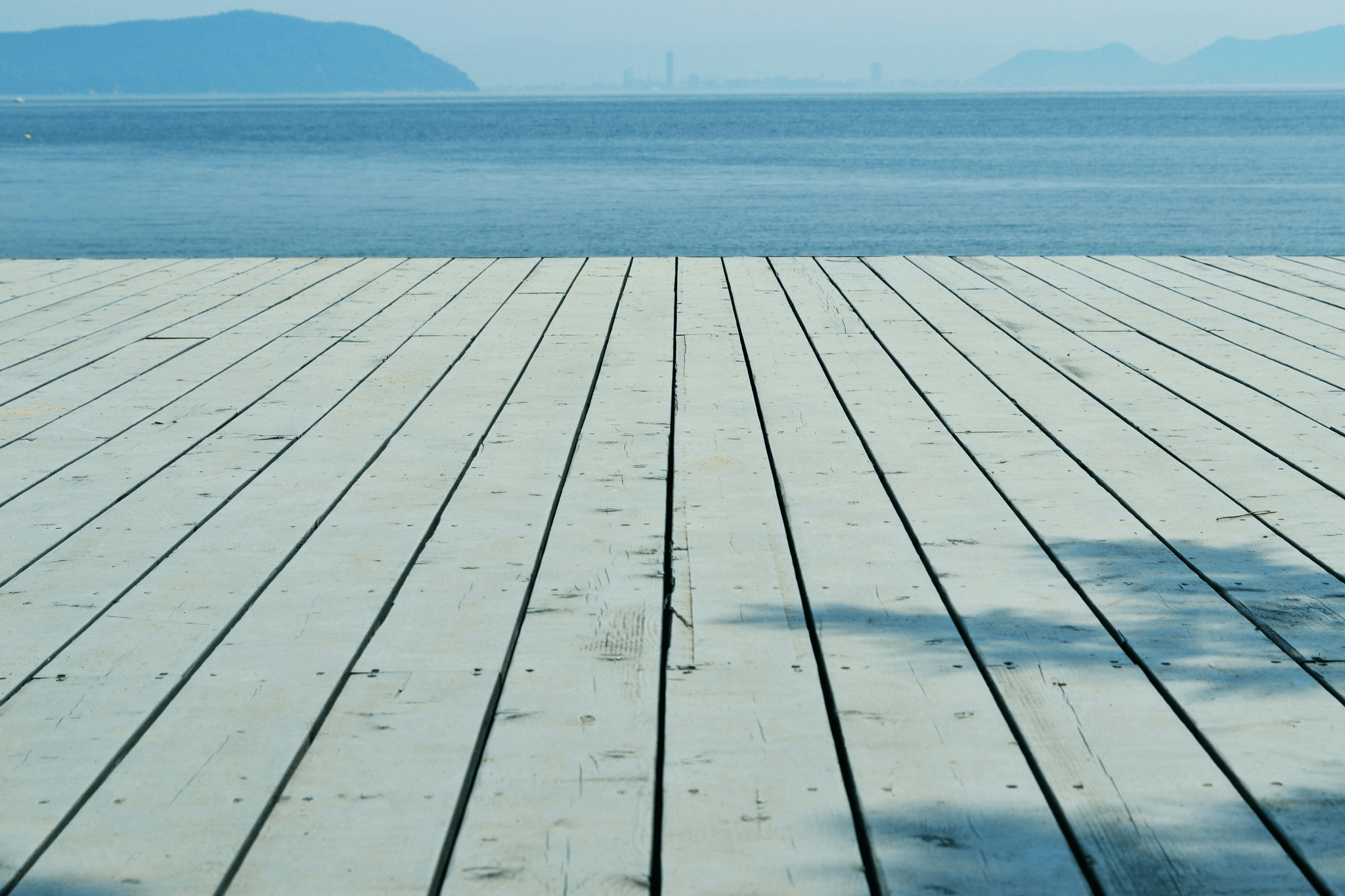Introduction
In the world of outdoor living, the choice of decking material is crucial, especially for docks that endure constant exposure to water and weather. Composite decking has emerged as a popular alternative, offering a blend of durability and aesthetic appeal that traditional materials often lack. This guide will explore the best wood for dock decking and how composite options can elevate your waterfront experience.
Overview of Composite Decking for Docks
Composite decking is engineered from a mixture of wood fibers and recycled plastic, resulting in a material that mimics the look of natural wood while boasting enhanced longevity. For dock applications, this means less maintenance and greater resistance to moisture-related issues like warping or splintering—common problems associated with traditional wood choices. As more boaters and dock owners seek reliable solutions, composite materials are quickly becoming recognized as some of the best decking options available.
Why Choose Composite Over Wood?
When considering the best decking for your dock, composite materials offer several advantages over traditional wood options. First off, they provide superior resistance to rot and insects, meaning you won't have to worry about replacing boards every few years due to damage—a significant concern with pressure treated decking. Additionally, composites require minimal upkeep compared to their wooden counterparts; no sanding or staining is needed to maintain their beauty over time.
Key Features of Quality Composite Decking
Quality composite decking stands out due to its innovative design features that enhance both performance and aesthetics. Look for products that include UV protection to prevent fading under harsh sunlight, as well as slip-resistant surfaces for safety on wet docks—two critical factors when selecting the best wood for dock decking. Moreover, leading brands like Composite Decking Inc focus on sustainability by incorporating recycled materials into their products while ensuring they meet high standards for durability and style.
Understanding Composite Decking

Composite decking has emerged as a popular choice for outdoor spaces, particularly for docks where water exposure is a constant challenge. Unlike traditional wood, composite materials are engineered to resist the elements, making them an ideal solution for waterfront properties. By blending recycled materials with plastic, composite decking offers the aesthetic appeal of wood while providing enhanced durability and lower maintenance requirements.
What is Composite Decking?
Composite decking is a man-made material that combines wood fibers and plastic to create boards that mimic the look of natural wood without its drawbacks. This innovative material is designed to withstand moisture, insects, and rot—common issues faced by traditional wood options, especially when considering the best wood for dock decking. With its unique composition, composite decking provides homeowners with a long-lasting solution that requires far less upkeep compared to pressure treated decking.
The Evolution of Composite Materials
The journey of composite materials began in the 1990s when manufacturers sought ways to improve upon traditional lumber's limitations. Early versions of composite decking were often criticized for their appearance and performance; however, advancements in technology have led to significant improvements over the years. Today’s best decking options boast enhanced aesthetics and superior durability thanks to innovations in manufacturing processes and material compositions.
Benefits of Composite Decking for Docks
When it comes to choosing the best decking for your dock, composite materials offer numerous advantages over conventional options like pressure treated decking or other types of wood. For starters, they are resistant to fading, staining, and scratching—ensuring your deck retains its beauty through years of sun exposure and water splashes. Additionally, composite decking often proves more cost-effective in the long run due to lower maintenance needs and longer lifespan compared to traditional woods considered as the best wood for dock decking.
Top Brands for Dock Composite Decking

Trex: The Industry Leader
Trex has long been recognized as the industry leader in composite decking, and for good reason. Their products are engineered to provide superior durability while mimicking the aesthetic appeal of traditional wood. With a wide range of colors and styles available, Trex offers some of the best wood for dock decking that combines beauty with low maintenance requirements.
Trex's commitment to sustainability is also noteworthy; they utilize recycled materials in their manufacturing process, making them an eco-friendly choice. Furthermore, their innovative technology ensures resistance against fading, staining, and mold growth—common issues faced by traditional wood deck owners. If you're considering decking cost versus longevity and aesthetics, Trex is a brand that consistently delivers value.
TimberTech: Durability Meets Style
TimberTech has carved out a niche as a brand that seamlessly blends durability with style in its composite decking offerings. Known for their robust construction and realistic wood-like appearance, TimberTech products are among the best decking options available today. Homeowners appreciate how this brand provides solutions tailored specifically for docks while offering various colors and textures to match any design preference.
One standout feature is TimberTech's advanced technology that enhances resistance to damage from moisture and UV rays—an essential consideration when selecting the best wood for dock decking. Additionally, TimberTech prioritizes sustainability by using recycled materials in production without compromising quality or performance. When evaluating overall value including installation costs and long-term savings, TimberTech emerges as a strong contender.
Composite Decking Inc: Sustainable Solutions
At Composite Decking Inc., we are passionate about transforming outdoor spaces with high-quality, sustainable decking solutions. Our mission is to provide homeowners, builders, and designers with durable yet visually stunning composite materials that stand the test of time while avoiding common pitfalls associated with traditional wood options like pressure treated decking.
Our products combine modern technology with eco-friendly innovation—offering you all the beauty of natural wood without its drawbacks such as warping or splintering over time. With years of industry experience under our belt, we focus on delivering exceptional customer service along with our top-tier products designed specifically for docks and other outdoor applications where water exposure is frequent. Choosing Composite Decking Inc means investing in long-lasting quality at competitive pricing compared to other leading brands when considering overall decking cost.
Evaluating the Best Wood for Dock Decking

Comparing Composite with Traditional Wood
When comparing composite with traditional wood, the differences become clear quite quickly. Composite materials offer superior resistance to rot, splintering, and insect damage—issues that plague even the best decking wood over time. Moreover, while the initial investment in composite may be higher than that of pressure treated decking or other woods, its longevity and low maintenance requirements often lead to better long-term value.
Traditional woods like cedar and redwood are undeniably beautiful but require regular upkeep such as sealing and staining to maintain their aesthetic appeal. On the other hand, composite decking requires minimal maintenance—just an occasional wash with soap and water will do! If you want an attractive dock that stands up against weather elements without constant care, composite could be your best option.
The Role of Pressure Treated Decking
Pressure treated decking is often touted as a durable choice for outdoor projects; however, it comes with its own set of drawbacks when compared to composite options. This type of wood is chemically treated to resist decay and insects but can still warp or crack over time due to moisture exposure. For those searching for the best wood for dock decking that can withstand harsh conditions without much fuss, pressure treated lumber might not always deliver.
While pressure treated options may seem cost-effective upfront, they require more frequent replacements than composites due to wear and tear from environmental factors like sun exposure and water damage. Additionally, pressure-treated woods can leach chemicals into nearby water bodies—a consideration that's critical if you're building a dock on a lake or river. For eco-conscious builders looking at sustainable solutions like those offered by Composite Decking Inc., opting for composite materials might be a more responsible choice.
Cost Analysis of Various Decking Options
Decking cost is always a pivotal factor in any construction project; therefore understanding how different materials stack up financially is crucial. The initial price tag on high-quality composites may raise eyebrows compared to traditional woods or pressure treated lumber; however, when you factor in longevity and reduced maintenance costs over time—the scales tip in favor of composites quite dramatically.
For instance, while you might pay less initially for pressure treated decking or some types of hardwoods like pine or fir (the so-called best decking), consider what those savings mean down the road when repairs or replacements come calling after just a few seasons! In contrast, investing in quality composites means fewer headaches regarding upkeep while enjoying your dock longer without worrying about rotting boards or splinters underfoot.
In summary: while traditional woods have their charm—and yes they can be beautiful—the long-term benefits provided by durable materials such as those from Composite Decking Inc make them worth considering if you're serious about creating an outdoor space that lasts!
Factors Influencing Decking Cost

Material Costs vs. Installation Costs
Material costs for decking can range dramatically depending on whether you opt for composite or traditional wood options like pressure treated decking. While the initial price of composite materials may be higher than the best wood for dock decking, it's essential to consider how installation costs will affect your overall budget. Often, composite options require less maintenance and fewer repairs over time, which can lead to savings that offset those upfront material expenses.
Additionally, installation costs might vary based on the complexity of the project and local labor rates. If you're leaning toward pressure treated decking due to its lower initial cost, remember that you might face higher long-term maintenance expenses compared to composite alternatives. Ultimately, balancing these factors will help you determine which option provides the best value in terms of both material and installation costs.
Long-Term Savings with Composite Decking
Investing in composite decking not only offers immediate benefits but also long-term savings that traditional wood simply can't match. The durability of composite materials means they resist fading, splintering, and rotting—common issues associated with the best wood for dock decking like untreated lumber or even pressure treated options over time. This longevity translates into fewer repairs and replacements down the line.
Moreover, many homeowners find that their maintenance routine becomes significantly easier with composites; no staining or sealing is required! This ease of upkeep can save both time and money in comparison to maintaining wooden docks year after year. When considering all these factors together, it’s clear why many are making the switch to composite materials as their go-to choice for dock surfaces.
How Climate Affects Decking Choices
Climate plays a pivotal role in determining which type of decking is best suited for your dock environment—especially when comparing options like pressure treated decking versus composites or other woods known for their resilience against weather elements. In regions with high humidity or extreme temperatures, traditional wood may warp or deteriorate more quickly than its composite counterparts designed specifically to withstand such conditions.
Furthermore, if you're located near saltwater environments where corrosion is a concern, opting for high-quality composites could be wise since they are engineered to resist moisture damage without sacrificing aesthetics—making them one of the best choices available today! Understanding how climate impacts durability will guide you toward making an informed decision about which material will serve you well over time while minimizing future replacement needs.
Maintenance and Longevity

Why Composite Lasts Longer
Composite decking outshines traditional wood in terms of longevity due to its unique blend of materials that resist rotting, splitting, and warping. Unlike the best wood for dock decking, which can succumb to moisture and pests over time, composite options are engineered to endure harsh conditions without degrading. This resilience not only prolongs the life of your deck but also offers peace of mind knowing you’ve made a sound investment.
Easy Maintenance Tips for Dock Decking
Maintaining your dock's composite decking is straightforward, requiring minimal effort compared to traditional wood alternatives. Regularly sweeping away debris and hosing down the surface can keep it looking fresh year-round; no need for extensive treatments or sealants like those required with pressure treated decking. For deeper cleaning, a mild soap solution works wonders—just avoid abrasive cleaners that could scratch the surface.
Common Issues with Traditional Wood Decking
While traditional wood may be appealing initially, it often leads to headaches down the line due to common issues such as splintering, warping, or insect damage. These problems not only detract from the aesthetic appeal but also incur additional costs in repairs or replacements—further driving up overall decking cost. In contrast, opting for composite solutions eliminates many of these concerns while providing an elegant look that rivals even the best decking wood available today.
Conclusion

In conclusion, choosing the right decking for your dock is crucial for both aesthetics and functionality. Composite decking has emerged as a top contender, offering durability and low maintenance compared to traditional wood options. Whether you're considering Trex, TimberTech, or Composite Decking Inc, each brand provides unique features that cater to various needs.
Summary of Best Composite Options
When searching for the best wood for dock decking, it's essential to weigh the benefits of composite materials against traditional choices. Trex stands out as an industry leader with its innovative designs and reliable performance. Meanwhile, TimberTech combines style with durability, and Composite Decking Inc offers sustainable solutions that are perfect for eco-conscious homeowners looking for the best decking options.
Final Thoughts on Decking Choices
Ultimately, selecting the best decking comes down to personal preference, budget considerations like decking cost, and long-term maintenance implications. While pressure treated decking may seem like a viable option due to its initial lower cost, it often requires more upkeep over time compared to composite materials. Investing in high-quality composite options can save you money in the long run while providing a beautiful outdoor space that enhances your dock's appeal.
Importance of Quality for Docks
Quality is paramount when it comes to dock decking; after all, this is where you’ll be spending time enjoying nature or entertaining guests. The best wood for dock decking should not only withstand harsh weather conditions but also maintain its appearance over years of use. By prioritizing quality materials like those offered by Composite Decking Inc., you ensure your investment lasts while enhancing your outdoor experience.
